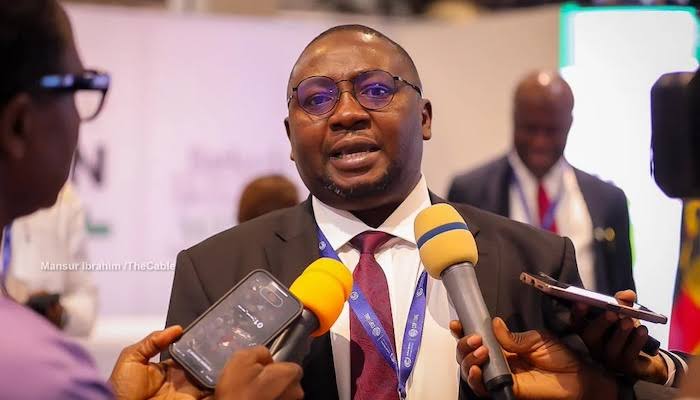Nigeria’s Minister of Power, Adebayo Adelabu, has reiterated the federal government’s commitment to improving the nation’s power supply, citing recent strides and ambitious plans to address the country’s chronic electricity challenges. Speaking at various public engagements, Adelabu highlighted a series of initiatives aimed at boosting generation, upgrading transmission infrastructure and expanding distribution networks. He emphasized that the administration of President Bola Tinubu has made significant progress in stabilizing the power sector, with generation capacity reportedly increasing from 4,100 megawatts (MW) in 2023 to over 5,270 MW by late 2024, and a peak of 5,801 MW recorded recently.
The cornerstone of these efforts is the $2.3 billion Siemens deal, signed to modernize Nigeria’s aging transmission infrastructure. This agreement, part of the Presidential Power Initiative, focuses on upgrading the national grid to reduce frequent collapses, which have plagued the country for decades. Adelabu noted that 149 projects under the Transmission Company of Nigeria (TCN) are in progress, requiring an estimated N2.77 trillion to complete, aimed at enhancing grid reliability and capacity.
Decentralization is another key strategy, enabled by the Electricity Act of 2023, which allows states and private entities to generate and distribute power independently. This legislative shift has spurred initiatives like the 2.5 MW solar hybrid plant commissioned in Kaduna, designed to provide reliable electricity to federal institutions. Additionally, the Rural Electrification Agency (REA) is implementing projects to connect remote communities, with plans to install mini-grids and solar home systems to bridge the access gap, where over 85 million Nigerians currently lack electricity.
Despite these advancements, significant hurdles remain. Adelabu has acknowledged that vandalism of power infrastructure, particularly in regions like the North-East, continues to disrupt supply. The sector also faces a staggering N2 trillion debt to power generation companies in 2024, which hampers their ability to operate efficiently. Adelabu estimates that achieving a stable power supply would require $10 billion annually for 20 years—a total of $200 billion—a figure that has drawn criticism from analysts who argue it is unrealistic given Nigeria’s economic constraints.
The minister has pointed to recent milestones, such as the completion of the 150 MVA 330/132kV transformer at Mando and other TCN projects, as evidence of progress. He also highlighted the role of private sector partnerships, with companies like De-Sadel and Interconnect leading efforts to build new substations and transmission lines. These projects aim to address bottlenecks in the transmission network, which currently loses significant power due to outdated infrastructure.
Public sentiment, as reflected is mixed. Some acknowledge marginal improvements in power supply in certain regions, particularly urban centers but others express frustration over persistent outages and the slow pace of reforms. Critics argue that previous administrations have made similar promises with limited results, pointing to systemic issues like corruption and mismanagement that have long plagued the sector.
Adelabu has emphasized that the current administration’s reforms are holistic, addressing generation, transmission, and distribution simultaneously. He cited the integration of renewable energy sources, such as solar and hydroelectric projects, as part of a long-term strategy to diversify Nigeria’s energy mix. For instance, the Zungeru hydropower plant and other renewable initiatives are expected to add significant capacity to the grid in the coming years.
However, the financial burden of these reforms remains a concern. The government’s plan to remove electricity subsidies entirely, as part of broader economic reforms, has raised fears of higher tariffs for consumers already struggling with inflation. Adelabu has defended this move, arguing that subsidies are unsustainable and that cost-reflective tariffs will attract more investment into the sector, ultimately benefiting consumers through improved service delivery.
International partnerships are also playing a role, with organizations like the World Bank and the African Development Bank providing funding for grid expansion and rural electrification projects. These investments are critical, as Nigeria’s population of over 200 million demands a robust and scalable power infrastructure to support economic growth. Adelabu has stressed that the government is working to create an enabling environment for private investors, including policies to protect investments and ensure returns.
While Adelabu remains optimistic, describing recent achievements as “the tip of the iceberg,” the scale of the challenge is daunting. Nigeria’s power sector requires not only financial investment but also technical expertise and political will to overcome entrenched inefficiencies. The minister has called for patience, asserting that the benefits of ongoing reforms will soon become evident to Nigerians across the country.
In summary, while Nigeria’s power sector is seeing incremental improvements under Adelabu’s leadership, the road to reliable electricity remains long. The combination of infrastructure upgrades, legislative reforms, and private sector involvement offers hope, but systemic challenges like debt, vandalism, and funding gaps continue to loom large. As the government pushes forward, the success of these initiatives will depend on sustained commitment and effective execution.




